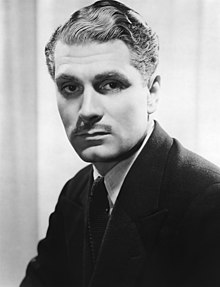
Back AnexoːCarrera teatral y cinematográfica de Laurence Olivier Spanish Фильмография Лоренса Оливье Russian

| ||
|---|---|---|
|
|
||
Laurence Olivier (1907–1989) was an English actor who, along with his contemporaries Ralph Richardson and John Gielgud, dominated the British stage of the mid-20th century. He also worked in films throughout his career, playing more than fifty cinema roles. From 1935 he performed in radio broadcasts and, from 1956, had considerable success in television roles.
After attending drama school, Olivier began his professional career with small touring companies before being taken on in 1925 by Sybil Thorndike and her husband, Lewis Casson, as a bit-part player, understudy and assistant stage manager for their London company.[1] In 1926 he joined the Birmingham Repertory Company,[2] where he was given the chance to play a wide range of key roles.[3] In 1930 he had his first important West End success in Noël Coward's Private Lives, and in 1935 he played in a celebrated production of Romeo and Juliet alongside Gielgud and Peggy Ashcroft, and by the end of the decade he was an established star. In the 1940s, together with Richardson and John Burrell, Olivier was the co-director of the Old Vic, building it into a highly respected company. There his most celebrated roles included Shakespeare's Richard III and Sophocles's Oedipus. In the 1950s Olivier was an independent actor-manager, but his stage career was in the doldrums until he joined the avant garde English Stage Company in 1957 to play the title role in The Entertainer. From 1963 to 1973 he was the founding director of Britain's National Theatre, running a resident company that fostered many future stars. His own parts there included the title role in Othello (1964) and Shylock in The Merchant of Venice (1970).[4]
In 1930, to gain money for his forthcoming marriage, Olivier began his film career with small roles in two films.[5] In 1939 he appeared as Heathcliff in Wuthering Heights in a role that saw him nominated for the Academy Award for Best Actor. The following year he was again nominated for the same award for his portrayal of Maxim de Winter in Rebecca. In 1944 he produced, directed and appeared as Henry V of England in Henry V. There were Oscar nominations for the film, including Best Picture and Best Actor, but it won none and the film instead won a "Special Award".[6] He won the Best Actor award for the 1948 film Hamlet, which became the first non-American film to win the Academy Award for Best Picture.[7][8][a] He later received Oscar nominations for roles in Richard III (1955), The Entertainer (1960), Othello (1965), Sleuth (1972), Marathon Man (1976) and The Boys from Brazil (1978). In 1979 he was also presented with an Honorary Award, at the Academy Awards, to recognise his lifetime of contribution to the art of film. He was nominated for nine other acting Oscars and one each for production and direction.[10] Throughout his career Olivier appeared in radio dramas and poetry readings, and made his television debut in 1956.
After being ill for the last twenty-two years of his life, Olivier died of kidney failure on 11 July 1989.[4] Reflecting on Olivier's pioneering of Britain's National Theatre,[11] the broadcaster Melvyn Bragg wrote: "[N]o one doubts that the National is perhaps his most enduring monument".[12] Olivier's claim to theatrical greatness lay not only in his acting, but by being, in the words of the English theatre director Peter Hall, "the supreme man of the theatre of our time".[13]
- ^ Beckett 2005, pp. 18–19.
- ^ Jackson 2013, p. 67.
- ^ Holden 1988, p. 455.
- ^ a b Billington 2004.
- ^ Olivier 1994, pp. 81–82.
- ^ Cite error: The named reference
Oscar: Henrywas invoked but never defined (see the help page). - ^ Cite error: The named reference
BFI: Hamletwas invoked but never defined (see the help page). - ^ Munn 2007, pp. 145–147.
- ^ Cite error: The named reference
Oscar: Hamletwas invoked but never defined (see the help page). - ^ Cite error: The named reference
LO: Oscarswas invoked but never defined (see the help page). - ^ Cite error: The named reference
times-obitwas invoked but never defined (see the help page). - ^ Bragg 1989, p. 103.
- ^ Hall 1984, p. ix.
Cite error: There are <ref group=lower-alpha> tags or {{efn}} templates on this page, but the references will not show without a {{reflist|group=lower-alpha}} template or {{notelist}} template (see the help page).
© MMXXIII Rich X Search. We shall prevail. All rights reserved. Rich X Search
